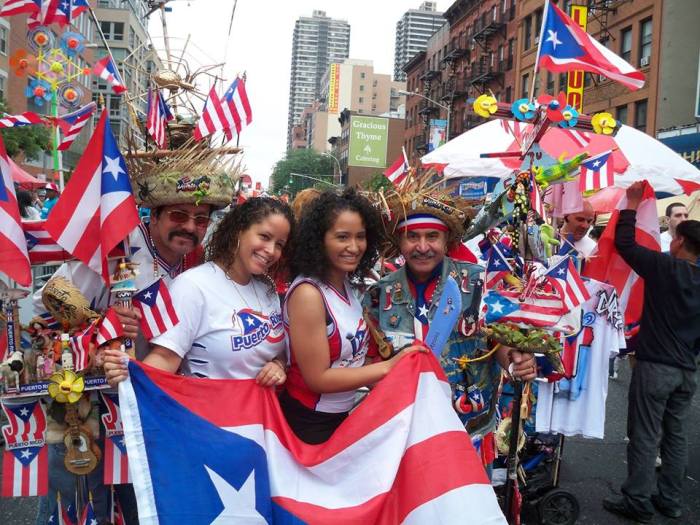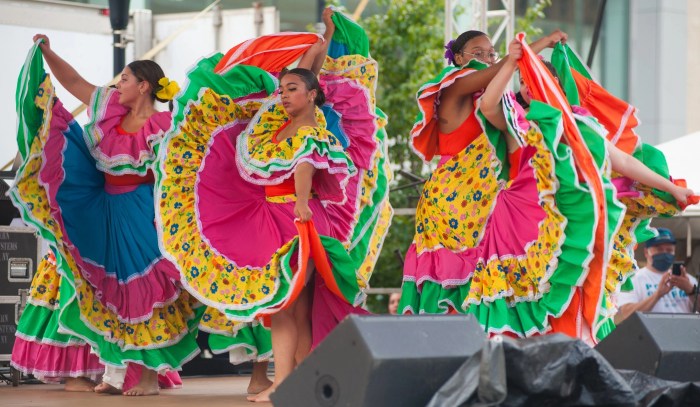Puerto Rican Festival In Rochester isn’t just a festival; it’s a vibrant tapestry woven from generations of culture, music, and community. This annual event pulsates with the rhythm of traditional bomba and plena, the aroma of mofongo and lechón, and the infectious energy of a community fiercely proud of its heritage. It’s a journey through the heart of Puerto Rican identity, right here in Rochester, showcasing its rich history and its enduring spirit.
From its humble beginnings to its current status as a major Rochester attraction, the festival has evolved, reflecting the changing demographics and aspirations of the Puerto Rican community. This deep dive explores the festival’s historical roots, its key events, its cultural significance, and its future prospects, painting a vivid picture of this essential part of Rochester’s cultural landscape. We’ll delve into the meticulous planning, the powerful community impact, and the unforgettable sensory experience that awaits attendees.
Cultural Significance and Community Impact: Puerto Rican Festival In Rochester

The Rochester Puerto Rican Festival plays a vital role in preserving and celebrating a vibrant culture within a larger community. It’s more than just a festival; it’s a powerful engine for cultural preservation, community building, and economic growth, showcasing the significant contributions of the Puerto Rican community to the city of Rochester. Its impact extends far beyond the few days of festivities, leaving a lasting legacy on the cultural landscape and economic vitality of the region.The festival acts as a crucial platform for preserving and promoting Puerto Rican heritage in Rochester.
Through music, dance, food, and art, it showcases the richness and diversity of Puerto Rican culture, ensuring its continuity for future generations. This vibrant display counters the homogenizing forces of modern society and helps maintain a strong sense of identity among Puerto Ricans in Rochester. The festival provides a space for the transmission of cultural traditions, from culinary practices to musical styles, creating a living archive of Puerto Rican heritage accessible to all.
Preservation and Promotion of Puerto Rican Culture
The festival’s commitment to cultural preservation is evident in its diverse programming. Traditional music performances, featuring both established artists and emerging talent, showcase the island’s musical heritage, from salsa and plena to bomba and reggaeton. Similarly, dance troupes demonstrate the expressive power of Puerto Rican dance forms, highlighting their intricate rhythms and movements. The festival also features artisan displays, showcasing traditional crafts and providing opportunities for artists to share their skills and connect with the wider community.
Food vendors offer authentic Puerto Rican cuisine, allowing attendees to experience the flavors and culinary traditions of the island. This multifaceted approach ensures that a wide range of cultural aspects are celebrated and preserved.
Community Building and Fostering a Sense of Belonging
The festival serves as a powerful unifying force for the Puerto Rican community in Rochester. It provides a space for individuals to connect with their heritage, celebrate their identity, and build relationships with others who share similar backgrounds. The event transcends age, socioeconomic status, and other demographic factors, creating a sense of shared experience and collective pride. This shared experience fosters strong social bonds and strengthens the overall cohesion of the Puerto Rican community in Rochester.
The festival provides a platform for networking, collaboration, and the formation of lasting friendships.
Economic Impact on the Local Economy
The Rochester Puerto Rican Festival generates significant economic activity within the city. The event attracts large crowds, boosting sales for local businesses, particularly food vendors, artisans, and nearby retailers. The festival also creates temporary employment opportunities for residents, ranging from event staff to security personnel. Furthermore, the increased tourism and spending associated with the festival contribute to the overall economic vitality of the city.
The positive economic ripple effect extends beyond the immediate festival period, creating a sustained benefit for the local economy. One could estimate the economic impact by analyzing vendor sales, employment data, and tourism statistics from the event, comparing those figures to similar events in the region.
Comparison with Similar Festivals in Other Cities
While precise economic impact data is difficult to gather for a direct comparison, the Rochester Puerto Rican Festival shares commonalities with similar cultural events in other cities, such as the National Puerto Rican Day Parade in New York City or smaller, localized celebrations across the United States. These events generally share similar characteristics: showcasing cultural heritage, fostering community pride, and providing an economic boost to the host city.
The scale and impact will vary depending on the size of the Puerto Rican community and the resources allocated to the event. However, the underlying function of cultural preservation and community building remains consistent across these festivals, demonstrating the widespread importance of such celebrations.
Festival Organization and Logistics

The success of a large-scale event like the Puerto Rican Festival in Rochester hinges on meticulous planning and a robust organizational structure. Effective coordination across multiple teams is crucial for seamless execution, ensuring a positive experience for attendees and participants alike. This requires a clear division of responsibilities, proactive communication, and a detailed logistical plan that anticipates potential challenges.The organizational structure typically mirrors the multifaceted nature of the festival.
Key committees handle specific aspects of the event, working in tandem to achieve a unified vision. This collaborative approach is essential for managing the diverse elements of a vibrant cultural celebration.
Organizational Structure, Puerto Rican Festival In Rochester
The festival’s organizational structure often comprises several key committees, each with specific responsibilities. A steering committee provides overall direction and strategic guidance. Sub-committees might focus on areas such as fundraising, marketing and publicity, logistics and operations, programming and entertainment, volunteer coordination, and food and beverage management. Each committee typically has a chair or lead responsible for overseeing its activities and reporting to the steering committee.
Clear lines of communication and regular meetings are crucial to ensure efficient collaboration and problem-solving. Roles within each committee are clearly defined, ensuring accountability and preventing duplication of effort. For example, the marketing committee might have roles for social media management, print advertising, and public relations. The logistics committee would manage aspects like venue setup, vendor coordination, and waste management.
Logistical Planning
Logistical planning for a festival of this scale is a complex undertaking. It involves meticulous attention to detail, anticipating potential bottlenecks and developing contingency plans. Key aspects include securing a suitable venue, managing vendor contracts, arranging for necessary equipment rentals (stages, sound systems, lighting, etc.), coordinating transportation and parking, developing a detailed site map, and implementing safety and security protocols.
Effective risk management is crucial, considering factors such as weather conditions, crowd control, and potential emergencies. A comprehensive logistical plan acts as a roadmap, guiding the event’s execution from start to finish. For example, a detailed schedule for setup and takedown, including timelines and responsibilities for each team, is essential.
Securing Permits, Sponsorships, and Volunteers
Obtaining the necessary permits from local authorities is a critical first step. This typically involves applying well in advance, providing detailed event plans, and demonstrating adherence to safety and regulatory requirements. Securing sponsorships is vital for funding the festival. This requires developing a compelling sponsorship package that highlights the benefits of association with the event. Approaching potential sponsors – businesses, organizations, and individuals – with tailored proposals that align with their interests is essential.
Recruiting and managing volunteers is crucial for operational efficiency. This involves creating an engaging volunteer recruitment strategy, providing clear roles and responsibilities, conducting training sessions, and ensuring adequate supervision during the event. Effective volunteer management fosters a sense of community ownership and contributes to the festival’s success. A well-structured volunteer program can significantly reduce costs and enhance the overall experience.
Step-by-Step Festival Planning Guide
- Inception & Concept Development: Define the festival’s goals, theme, target audience, and overall vision.
- Budgeting & Funding: Develop a detailed budget outlining anticipated expenses and revenue streams, exploring various funding avenues (sponsorships, grants, ticket sales).
- Team Formation & Committee Structure: Assemble a capable team, assigning specific roles and responsibilities to each committee.
- Venue Selection & Permits: Secure a suitable venue and obtain all necessary permits and licenses.
- Marketing & Promotion: Develop a comprehensive marketing strategy, utilizing various channels (social media, print media, public relations) to reach the target audience.
- Vendor Management: Recruit and manage vendors, ensuring a diverse range of food, crafts, and other offerings.
- Logistics & Operations: Plan the logistics, including setup, takedown, waste management, security, and emergency protocols.
- Volunteer Recruitment & Training: Recruit and train volunteers, assigning specific roles and responsibilities.
- Event Execution: Implement the plan on the day of the festival, ensuring smooth operations and addressing any unforeseen issues.
- Post-Event Evaluation: Conduct a thorough post-event evaluation, analyzing successes and areas for improvement to inform future planning.
The Puerto Rican Festival in Rochester stands as a testament to the power of cultural preservation and community building. More than just a celebration, it’s a living, breathing entity that reflects the resilience and vibrancy of the Puerto Rican community. As the festival continues to evolve, adapting to the changing times while staying true to its roots, it promises to remain a vital part of Rochester’s cultural fabric for years to come.
Its enduring legacy lies not just in its festive atmosphere but in its ability to connect generations, fostering a sense of belonging and pride within the community and beyond.